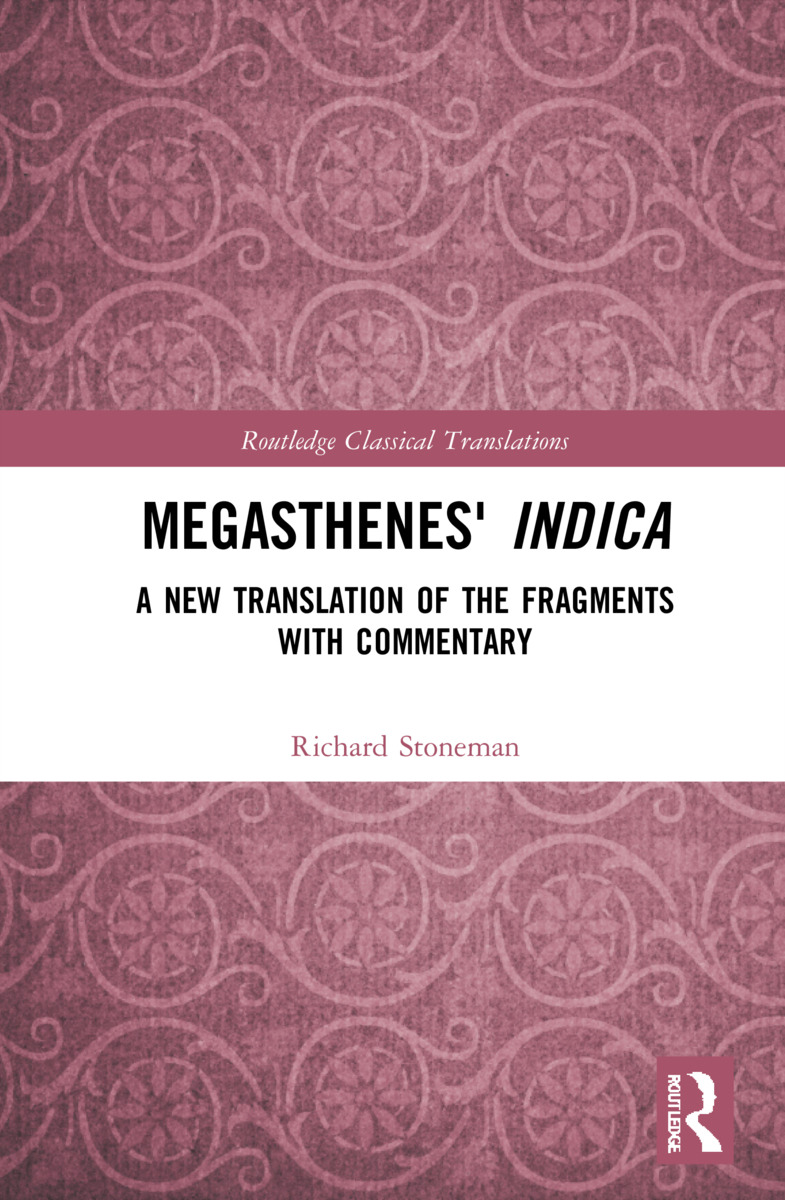Good day everyone, thanks to be here on Alessandro III di Macedonia! Here’s an interesting new release that to me is a to buy book (sadly I’ll wait for the paperback edition). It’s not a publication about Alexander the Great but is part of classical literature and ancient history and is signed by a very important name. I’m talking about:
Megasthenes’ Indica
A New Translation of the Fragments with Commentary
By Richard Stoneman
Out on: July 27, 2021 by Routledge

This book provides a new translation of all the surviving portions of the description of India written by Megasthenes in about 310 BCE, the fullest account of Indian geography, history and customs available to the classical world. The Indica was a pioneering work of ethnography that exemplified a new direction in Hellenistic writing; India was little-known to the Greeks before the expedition of Alexander the Great in 326–325 BCE, and Megasthenes, who resided as an ambassador in the Maurya capital Pataliputra for some time, provided the classical world with most of what it knew about India.
Megasthenes’ book, which became a classic in antiquity, now survives only in fragments preserved in other Greek and Latin authors. Stoneman’s work offers a reliable and accessible version of all the writings that can plausibly be ascribed to Megasthenes. His subject ranges from detailed accounts of social structure and the royal household, to descriptions of elephant hunting and Indian philosophical ideas. His book is the only written source contemporary with the Maurya kingdom of Candragupta, since writing was not in use in India at this date. This translation provides a path to clearer understanding of Greek ethnography and a valuable resource on Indian history.
The book will be of value not only to classical scholars with an interest in Hellenistic history and cultural attitudes, and to their students, but also to scholars working on the early history of India, who have had to rely (unless they are also Greek scholars) on scattered and dated collections of evidence.
Richard Stoneman is an Honorary Visiting Professor in the Department of Classics and Ancient History, University of Exeter, UK. His research concentrates on the legends of Alexander the Great and on Greek knowledge of India (most of which was due to Alexander’s campaign). His books include Alexander the Great: A Life in Legend (2008) and The Greek Experience of India: From Alexander to the Indo-Greeks (2019). His three-volume edition of the Alexander Romance is in the process of publication.
Table of Contents
Preface
Abbreviations and conventions
Concordance of Fragment Numbers with the Editions of Schwanbeck and Jacoby
Introduction
Life and Work
The Reliability of Megasthernes
What is a Fragment?
Other Greek Writers on India
Maps: North-west India
Megasthenes’ India
The Fragments
Book I: Geography and Resources
1. Summary of geography, history and society
2. The Geography of India
3. Geography and dimensions of India
4. The Himalayas (“Caucasus”)
5. Controversy on the size of India
6. The size of India again
7. The northern stars
8. Rivers
9. Megasthenes’ knowledge of India
10. The river Silas
11. The Fertility of India
12. Dionysus and Heracles
13. Dionysus and Heracles as civilizers
14. Pandaea
15. Taprobane
16. The kartazon
17. Pearls
18. Trees that grow in the sea
19. Poisonous fish
20. Monkeys (and other animals)
21. Snakes
22. The hoopoe (and other birds)
23. The gold-guarding ants
24. The monstrous races
25. The Reverse-feet
26. The Mouthless ones and the Dog-heads
27. Plutarch on the mouthless ones
Book II: Political Structures
28. The Seven ‘Castes’
29. Funeral rites
30. Absence of slavery
31. Meals
32. Cities
33. Palibothra (Pataliputra)
34. City officials
35. Laws and customs
36. Laws and punishments
37. Elephants
38. Elephant medicine
39. Elephant ethics
Book III: The Indian Philosophers
40. The Philosophers
41. Calanus and suicide
42. Calanus and Dandamis
43. The Brahmans
44. Strabo on Indian religion and philosophy
45. Brahmans austerity
46. Brahmans and Jews
Appendix
a. Other accounts of the philosophers
b. Pliny’s account of India
Commentary
Commentary on Book I
Commentary on Book II
Commentary on Book III
Commentary on Appendix
Table: Pliny’s Indian tribes
Bibliography
Index
Hardback
ISBN 9780367472948
172 Pages 2 B/W Illustrations
£ 120.00
eBook
ISBN 9781003038580
172 Pages 2 B/W Illustrations
£ 36.99
Add an alert to your Google Calendar here:
Thank you and have a good day,





